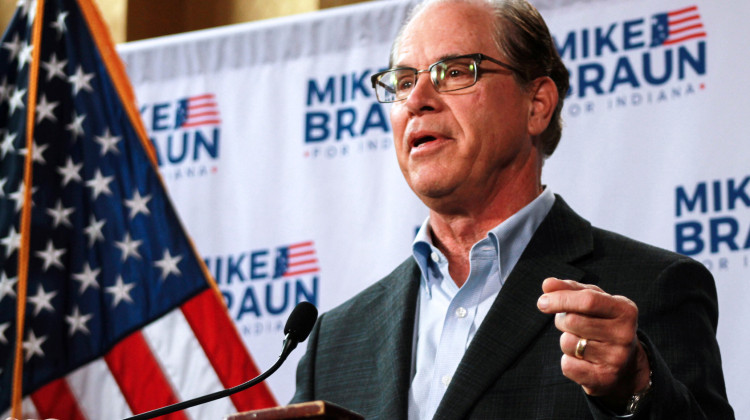
Gov.-elect Mike Braun released a detailed policy agenda focused on five areas: tax relief, government efficiency, workforce development, health care and public safety.
Brandon Smith/IPB NewsIndiana's in-coming governor Mike Braun’s campaign released a six-point healthcare plan back in September titled “Freedom and Opportunity Agenda” with the stated goals of improving quality, lowering costs, enhancing transparency, expanding access, promoting wellness, and increasing competition.
Braun’s more detailed policy plan, released in early December, mostly draws from existing policy documents like the Freedom and Opportunity Agenda.
As Governor, Braun can set an agenda he’d like legislators to adopt during the next session but many of his proposals will ultimately require approval from state lawmakers. Proposals similar to Braun’s have previously met hurdles in the state legislature in recent years.
State advocacy groups expressed support for much of Braun’s agenda, particularly measures to drive down costs for consumers, but some expressed concerns about what has been left out of the plan.
Bringing down health care costs
Health groups and advocacy organizations say they support a number of items in the plan aimed at reducing healthcare costs.
A recent study from Indiana University's Richard M. Fairbanks School of Public Health found that out-of-pocket costs were higher for people in Indiana compared to neighboring states.
Luke Messer, the chief executive of the Indiana Business Health Collaborative, said those higher costs don’t line up with the state’s relatively poor health outcomes.
Indiana’s mortality rates are worse when compared to both the U.S. as a whole and most neighboring states, driven by high mortality rates from diabetes, cancer, drug overdoses, and alcohol. And many of the state’s health outcomes have worsened since 2020, particularly with obesity, asthma, and substance use disorders.
“The bottom line is we need to do better,” Messer said. “We need to have better health outcomes, and we need to have better health costs.”
The Braun plan includes a number of items aimed at bringing down healthcare costs including an effort to protect against surprise billing, plans to block insurance companies from rescinding prior authorizations, and a stipulation that hospitals provide good faith estimates for care.
Tracey Hutchings-Goetz is the communications and policy director for Hoosier Action, a local advocacy organization that’s launching education initiatives to help patients understand their rights around medical billing and how to contest medical bills.
She said she’s excited about some of the proposals as someone who has received surprise medical bills herself.
But items in Braun’s plan, including on prior authorization, have previously failed to pass through the state legislature.
Some elements of the plan build on existing legislation, including a move to require that all healthcare industry mergers and acquisitions receive approval from the State Attorney General. The move builds on a law passed earlier this year that allows the Attorney General to review mergers valued at $10 million or more.
“What Braun proposed would actually be amongst the strongest protections in the nation,” said Hutchings-Goetz. “We know that when [a merger] happens, you see both a reduction in quality of care and you see a jacking up of costs for patients.”
Braun’s plan also aims to expand access to care in rural markets, both through telehealth and a pledge to expand rural training placements for obstetricians and other in-demand specialists.
But the plan focuses too heavily on the consumer side and not enough on attracting and maintaining new health care talent, according to Messer of the Indiana Business Health Collaborative.
A recent study by IU has found that a relative shortage of physicians was driving up both salaries and facility operating costs, which can contribute to the patient’s final bill.
“We can't have a healthy and prosperous state without the health care workforce needed to keep our state healthy,” Messer said. “We're competing with neighboring states trying to get that talent.”
One tool Messer hopes to see is an increase of in-state medical residency training programs, to retain local medical school graduates.
Braun’s plan does include some changes to support healthcare workers, including a ban on noncompete clauses in contracts. Some worry non-compete clauses could cause physicians to leave the state to keep practicing medicine when they just need to switch employers.
According to the plan, Braun wants to “prohibit not for-profit hospitals from requiring licensed medical personnel to sign employment contracts that include non-compete agreements.”
In Indiana, a law passed in 2023 bans noncompete clauses for primary care doctors, but other specialities could still be subjected to those contracts.
At the federal level, a ban on noncompete clauses for all US workers set to take effect in September was blocked after a Texas judge ruled against it.
Braun’s plan would expand Indiana’s existing law to include all physicians, not just those working in primary care.
Potential Medicaid changes on the federal level will impact the state
When it comes to Medicaid, state advocates say they are happy with what is –– and is not –– in Braun’s plan.
Hutching-Goetz with Hoosier Action said she was pleased that the plan did not increase barriers to Medicaid access through additional paperwork or reporting work requirements to Medicaid programs.
“My hope is that’s because Senator Braun knows that they do not work, that they are not effective and often a waste of money, and end up creating churn in the system,” she said.
Braun’s plan also includes a planned audit of Indiana Medicaid claims as a safeguard against fraud.
But one aspect of Braun’s stated plan for Medicaid worries Hutching-Goetz: A proposal that would require Medicaid enrollees to consult a primary care physician before going to an emergency room for non-emergency problems.
According to Braun’s plan, the goal is to improve patient relationships with their primary care providers and reduce costs.
But Hutchings-Goetz said the rule could keep patients away from the emergency room, even if they need it.
“They are not able to assess for themselves what is a life-threatening emergency situation and what is not, and this rule could potentially be really dangerous,” she said.
All of this may not matter, however.
Federal changes to Medicaid could make at least some of Braun’s plans moot. National experts say that the incoming Trump administration may impose changes to the program, including things like work requirements, or institute broad cuts.
Indiana is also one of nine states with Medicaid trigger laws that would end their Medicaid expansion if federal funding falls. This puts hundreds of thousands of Indiana residents who are covered under the Medicaid expansion program at risk of losing coverage if the federal government cuts the extra funding that’s enabled the state to widen its Medicaid eligibility.
“[Medicaid] is really essential to keeping our state running and working,” Hutchings-Goetz said. “It funds so many of our rural hospitals and small health care providers, and it really keeps a lot of folks in Indiana continuing to be able to work. Any cuts to Indiana Medicaid would be pretty devastating.”
Others, like Messer with the Indiana Business Health Collaborative, say it matters how federal changes to Medicaid ultimately look.
“I think you'll also likely see a push to block grant more dollars out to states and to allow greater flexibility for state government policymakers to shape the policies they think that are best for their state,” he said. “So even that adversity could create some opportunities if it also comes with a lot of flexibility for state policymakers.”
Regardless, Messer said he expects Indiana’s healthcare system will look different in a few years.
“I think change is coming,” he said. “It's just a matter of leaders working together to make sure that that change is positive for our state and for individual Hoosiers.”
Contact health reporter Benjamin Thorp at bthorp@wfyi.org.
 DONATE
DONATE






 Support WFYI. We can't do it without you.
Support WFYI. We can't do it without you.